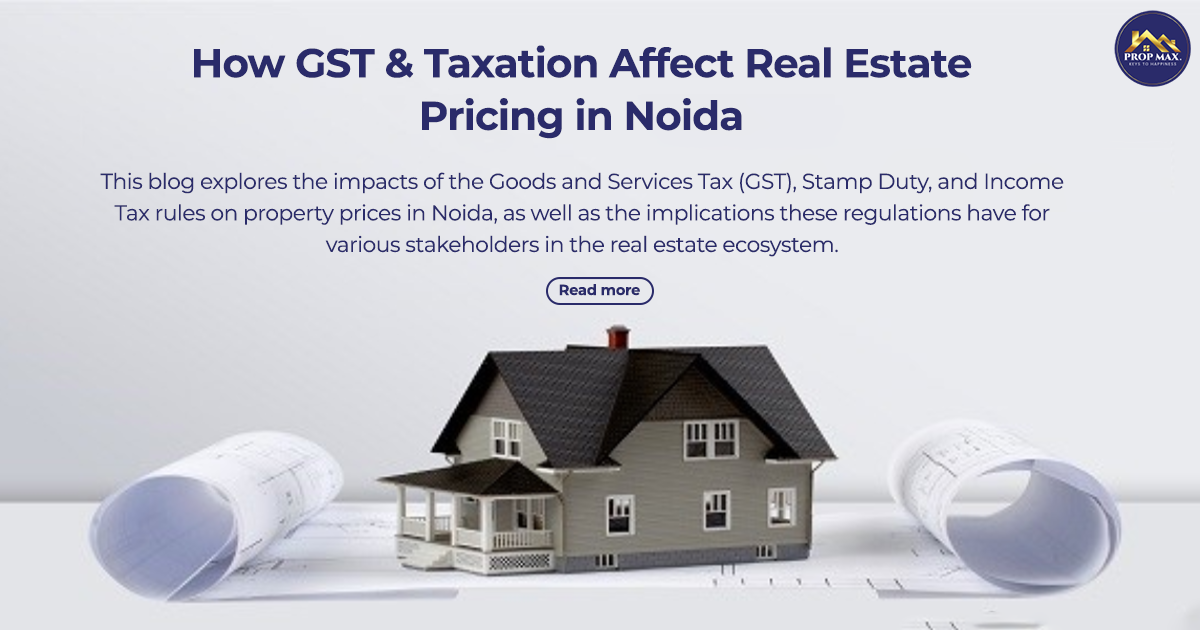How GST & Taxation Affect Real Estate Pricing in Noida

The establishment of the Goods and Services Tax (GST) has been a crucial factor in the significant transformations that have taken place in the Indian real estate market over the course of the past twelve years. The city of Noida, which is a hub for residential and commercial buildings and is seeing fast growth, has been directly influenced by changes in taxation regulations. In order to make educated choices, homebuyers, investors, and developers in Noida need to have a solid understanding of how the Goods and Services Tax (GST) and other tax consequences influence the cost of real estate. This blog explores the impacts of the Goods and Services Tax (GST), Stamp Duty, and Income Tax rules on property prices in Noida, as well as the implications these regulations have for various stakeholders in the real estate ecosystem.
Understanding the GST in Real Estate Transactions
For the purpose of simplifying India’s complicated tax structure, the Goods and Services Tax (GST) was implemented in 2017. Prior to the implementation of the Goods and Services Tax (GST), properties were subject to a number of taxes, including the Value-Added Tax (VAT), service tax, and other state-level charges. The implementation of a single tax structure under the Goods and Services Tax (GST) brought about clarity, but it also altered the dynamics of the costs.
GST on Properties That Are Still Under Construction
The following rates of GST are applicable for properties that are still in the process of being constructed:
- Housing that is affordable: one percent (without the input tax credit).
- Housing that is not affordable: five percent (without the input tax credit).
Developers are unable to submit claims for refunds of taxes paid on raw materials such as cement, steel, and labor because the input tax credit (ITC) is no longer available to them. Because of this, there has been an increase in the costs of building, which are ultimately communicated to the purchasers.
Ready-to-Move-In Properties Subject to Goods and Services Tax
For buyers, ready-to-move-in properties are a more appealing alternative because they are exempt from the Goods and Services Tax (GST). However, there are still additional expenditures that must be paid, such as stamp duty and registration fees.
Impact of Goods and Services Tax on Real Estate Prices in Noida
Real estate prices in Noida have increased as a result of a variety of tax consequences which have been observed. The Goods and Services Tax (GST) has the following effects on various categories of properties:
1. Real Estate for Residential Use
Because of the elimination of ITC, construction prices have increased, notably for housing that falls into the middle sector and luxury housing. In the process of pricing properties, builders take into account the Goods and Services Tax (GST), which results in under-construction flats being more expensive than ready-to-move-in ones.
2. Real Estate for Commercial Use
In comparison to residential real estate, the Goods and Services Tax (GST) on commercial buildings is 12%, and it comes with ITC benefits. This makes it more structured. The Goods and Services Tax (GST) applies to rental income from commercial locations, which adds to the price of running a business.
3. Housing Initiatives That Are Affordable
Because the Goods and Services Tax (GST) is only 1%, cheap housing continues to be the most appealing category, which encourages investments from purchasers with middle-incomes.
Additional taxes that are applicable to real estate in Noida
Besides the Goods and Services Tax (GST), other aspects of taxation have a considerable impact on the pricing of real estate.
1. Stamp duty and registration fees are the first charges
- Stamp Duty: The levels of stamp duty in Noida are as follows:
- Seven percent of purchasers are male.
- Five percent of purchasers are female.
- The percentage of dual ownership (male and female) is 6%.
- Registration fees are typically equal to one percent of the property’s value.
The total cost of purchasing property is greatly increased as a result of these fees or tax assessments.
2. The Income Tax on Transactions Involving Real Estate
- The Tax on Capital Gains:
- According to the income tax slab rates, gains on investments held for a period of less than two years are subject to taxation.
- Long-term capital gains, defined as those held for more than two years, are subject to a value-added tax rate of twenty percent.
- Deduction for Taxes on Interest Paid on Home Loans:
- In accordance with Section 80C, purchasers have the ability to claim a deduction of up to ₹1.5 lakh on the repayment of principal.
Under the provisions of Section 24(b), an additional deduction of up to ₹2 lakh can be claimed for the interest that is paid on house loans.
From the Developer's Standpoint: How Taxation Influences the Costs of the Project
When developing developments, developers in Noida are required to take into consideration a variety of tax liabilities. Among the most significant cost drivers are:
- Construction materials (cement, steel, paints, and so on) are subject to the Goods and Services Tax (GST).
- The consequences of the Goods and Services Tax (GST) on contracts
- Costs associated with land acquisition and stamp duty
- Revenue and profits are subject to income tax.
Due to the cumulative effect of these taxes, the price per square foot has increased, which has an influence on the buyers’ capacity to afford the property.
From the Perspective of a Homebuyer: Important Considerations
If you are considering purchasing a home in Noida, you should bear the following tax considerations in mind:
- As far as taxation is concerned, ready-to-move-in properties might be more affordable.
- Before closing a contract, it is important to compare the GST on newly constructed properties.
- When creating a budget, make sure to take into account stamp duty and registration fees.
- Make use of the tax benefits that are available on house loans in order to lessen the weight of financial obligations.
The Prospects for the Future: Will Taxation Policies Be Modified?
In an effort to reduce the cost of real estate, the government has been contemplating a number of different initiatives, including the following:
- A reduction in construction costs can be achieved by reintroducing the input tax credit for developers.
- Stamp duty rates should be lowered in order to make the purchase of real estate more affordable.
- To increase sales in the luxury market, the Goods and Services Tax (GST) rates on premium properties should be lowered.
The pricing of real estate in Noida could be considerably impacted by any policy changes that occur in these two regions.
Conclusion
Noida’s real estate values are significantly influenced by the Goods and Services Tax (GST) and other taxing measures. Despite the fact that the new tax system has made the structure easier to understand, it has also resulted in increased expenses in certain areas. Before deciding whether or not to make an investment, buyers should consider the potential tax effects, and developers should employ pricing strategies in order to maintain their competitive edge.
Keeping up with Propmax Realtors will provide you with the most recent information regarding the real estate trends in Noida.
PropMax Realtors is a trusted real estate company offering premium residential and commercial properties across India. With expert guidance and verified listings, we make property buying simple, secure, and profitable.
